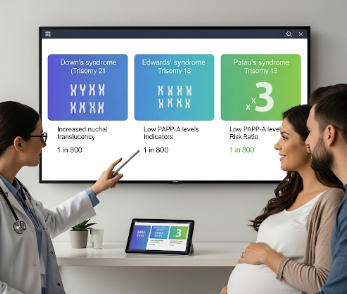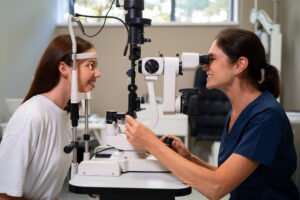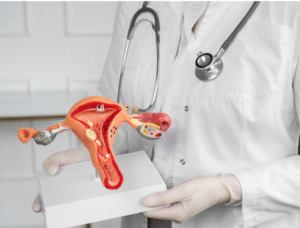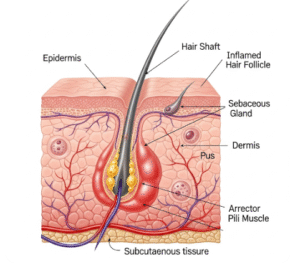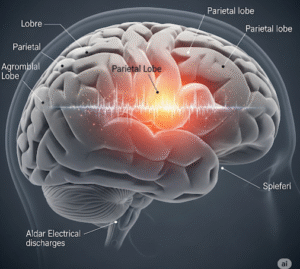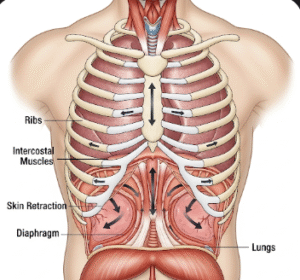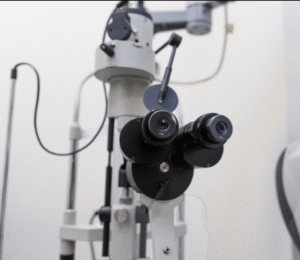What it is
Prenatal screening for Down’s Syndrome (Trisomy 21), Edwards’ Syndrome (Trisomy 18), and Patau’s Syndrome (Trisomy 13) involves specialized tests performed during pregnancy to assess the risk of these chromosomal abnormalities in the baby.
➡ Key facts:
- ✔ Down’s Syndrome (Trisomy 21): Causes intellectual disability, characteristic facial features, and possible heart defects.
- ✔ Edwards’ Syndrome (Trisomy 18): Associated with severe developmental delays, organ malformations, and low survival rates.
- ✔ Patau’s Syndrome (Trisomy 13): Leads to severe brain and organ defects, with most affected babies not surviving beyond infancy.
- ✔ Screening does not diagnose these syndromes but identifies risk levels, guiding whether diagnostic testing (such as amniocentesis or chorionic villus sampling) should be performed.
💡 In Korea, prenatal screening is a routine part of maternal care, offered in both public hospitals and private clinics, ensuring early detection and informed decision-making for parents.
Why it’s done
Doctors in Korea recommend chromosomal syndrome screening to:
➤ Identify pregnancies at high risk for Down’s, Edwards’, or Patau’s syndrome.
➤ Support early parental decision-making regarding further diagnostic testing.
➤ Provide counseling about health outcomes, treatment, and support options.
➤ Prepare for specialized care at birth if abnormalities are detected.
⚠ These conditions cannot be prevented, but early screening ensures parents are fully informed about potential health outcomes.
Alternatives
While standard screening is most common, alternatives in Korea include:
✔ Non-invasive prenatal testing (NIPT): Uses maternal blood to detect fetal DNA, highly accurate for trisomy conditions.
✔ First-trimester combined test: Combines ultrasound (nuchal translucency) with blood tests.
✔ Second-trimester quadruple test: Measures maternal blood markers.
✔ Diagnostic tests (if risk is high): Amniocentesis or chorionic villus sampling (CVS).
⚠ Ultrasound alone may show physical markers but is not as accurate without blood tests or genetic testing.
Preparation
Before undergoing screening in Korea:
🔹 Medical consultation → Doctors review maternal age, family history, and pregnancy risks.
🔹 Timing matters → Tests differ by trimester:
- First trimester (11–14 weeks): Nuchal translucency scan + blood test.
- Second trimester (15–20 weeks): Quadruple test.
- Anytime after 10 weeks: NIPT (blood test).
🔹 Counseling session → Parents are informed that results show risk probability, not diagnosis.
🔹 No fasting required → Blood tests can be done without special preparation.
How it’s done
➡ Step-by-step screening process in Korea:
- Appointment booking → With obstetrician or maternal-fetal medicine specialist.
- Ultrasound scan (first trimester) → Measures baby’s nuchal translucency (fluid at the back of the neck).
- Blood sample collection → Maternal blood analyzed for protein and hormone markers.
- Risk calculation → Results combined with maternal age and medical history.
- Report delivery → Given as probability (e.g., 1 in 200 chance).
- Next steps → If risk is high, doctor recommends NIPT or diagnostic testing (CVS, amniocentesis).
Effectiveness & Success Rate
✔ First-trimester combined screening: Detects ~85% of Down’s cases with a 5% false-positive rate.
✔ Second-trimester quadruple test: Detects ~75% of Down’s cases.
✔ NIPT in Korea: >99% accuracy for Down’s, >95% for Edwards’ and Patau’s.
✔ Diagnostic confirmation (CVS, amniocentesis): Nearly 100% accurate but invasive.
Recovery / Expected Outcomes
✔ Screening itself involves minimal discomfort (blood test + ultrasound).
✔ No recovery time needed; patients return to normal activities immediately.
✔ Results typically available within:
- 1–2 weeks for blood tests
- A few days for NIPT
- Immediate report for ultrasound findings
Complications / Considerations
⚠ Important considerations in Korea:
- Screening tests only indicate risk, not certainty.
- False positives and false negatives are possible.
- NIPT cost is higher, but many Korean families prefer it for accuracy.
- Diagnostic procedures (amniocentesis, CVS) carry a small miscarriage risk (~0.1–0.3%).
Treatment Options in Korea (If Screening is Positive)
🔹 Diagnosis
- CVS (10–13 weeks) → Placental tissue analysis.
- Amniocentesis (15–20 weeks) → Amniotic fluid genetic testing.
🔹 Medical treatments
- No cure for chromosomal syndromes, but supportive care plans can be arranged.
🔹 Surgical / advanced therapies
- Babies with Down’s Syndrome may undergo surgery for heart defects or digestive abnormalities after birth.
🔹 Rehabilitation & Support
- Special education programs for children with Down’s.
- Physical and occupational therapy to improve motor skills.
- Family counseling and genetic guidance.
Top Hospitals & Clinics in Korea for Prenatal Screening
🏥 Seoul National University Hospital (SNUH) – Advanced maternal-fetal medicine.
🏥 Samsung Medical Center – Offers comprehensive NIPT and genetic counseling.
🏥 Asan Medical Center – Specializes in high-risk pregnancy management.
🏥 Yonsei Severance Hospital – Known for expertise in pediatric genetics and neonatal care.
🏥 CHA Fertility & Women’s Hospitals – Widely used by expectant mothers for prenatal care.
Conclusion
Prenatal screening for Down’s, Edwards’, and Patau’s syndromes in Korea provides expectant parents with accurate, early, and reliable information about chromosomal abnormalities.
✔ Enables informed decision-making.
✔ Allows early preparation for medical and emotional support.
✔ Safe, accessible, and widely offered across Korea’s hospitals and clinics.
✔ NIPT is becoming the preferred option due to its high accuracy and non-invasive nature.
By integrating advanced genetic screening into routine maternal care, Korea ensures that families receive the highest standard of prenatal healthcare.

